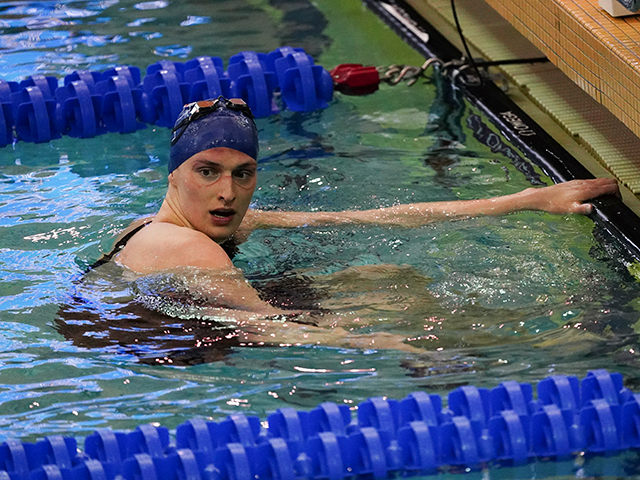Transgender UPenn swimmer Lia Thomas used his Tuesday morning appearance on Good Morning America to let his critics know that he doesn’t need “anybody’s permission” to participate in the sport he loves.
EXCLUSIVE: "Trans people don't transition for athletics. We transition to be happy and authentic and our true selves."
Transgender swimmer Lia Thomas speaks out to @JujuChangABC about backlash and future plans to compete. https://t.co/UFQOgMNBLj pic.twitter.com/FJcmyEChi9
— Good Morning America (@GMA) May 31, 2022
The interview conducted by GMA’s Juju Chang chronicled Thomas’ meteoric rise from a thoroughly mediocre three-year run on the UPenn men’s swimming team to suddenly beating Olympians and smashing world records on the women’s team.
Lia Thomas just took first place at the 2022 NCAA Division 1 Women's Swimming & Diving Championships in the 500 freestyle. #SaveWomensSports pic.twitter.com/UWvDQMYHRJ
— Colin Wright (@SwipeWright) March 17, 2022
However, after recapping Thomas’ historic run, Chang segued to the intense scrutiny the swimmer has encountered as a man taking over a women’s sport.
“But her athletic achievements on the women’s swim team igniting fierce debate over fairness in women’s sports,” Chang said. After airing criticisms from Martina Navratilova and Caitlyn Jenner, both citing how unfair it was for Thomas to be allowed to compete against women, Chang gave the UPenn swimmer a chance to respond.
“I knew there would be scrutiny against me if I competed as a woman,” Thomas said. “I was prepared for that, but I also don’t need anybody’s permission to be myself and to do the sport that I love.”
Thomas spoke about how he felt disconnected from his body as a man.
“I didn’t feel like I was a boy,” Thomas explained. “I was like, ‘This isn’t me, this isn’t who I am.’”
“Thomas earned a spot at her Ivy League dream school, UPenn, on the men’s team, but by her sophomore year, she says her gender dysphoria left her depressed and suicidal,” Chang said while providing a voice-over for the segment. The swimmer added that she was “barely going to classes, I could barely get out of bed, and I said, ‘I can’t live like this anymore. I want to be able to do things I enjoy.’”
The interview then touched on the hormone therapy Thomas went through to comply with NCAA requirements. According to Thomas, treatment was done for the sake of his happiness and not to gain a competitive advantage over female competitors.
“The mental and emotional changes happened very quickly. I was feeling a lot better mentally. I was less depressed, and I lost muscle mass and I became a lot weaker and a lot slower in the water,” Thomas claimed.
The transgender swimmer also pushed back on any claim that trans women choose to transition in order to dominate women’s sports.
“Trans people don’t transition for athletics,” Thomas said. “We transition to be happy and authentic and our true selves. Transitioning to get an advantage is not something that ever factors into our decisions.”
While Thomas may have slowed some from the swim times, he posted on the men’s team. There’s no dispute that joining a division where the competition was significantly slower radically vaulted him to the top of the sport.
Will Thomas, the name Lia Thomas competed under when swimming on the men’s team, was ranked 462nd in the NCAA. However, in one year on the women’s side, he became a national champion even with hormone therapy.
Not only is Thomas’ case a perfect example of the athletic superiority even an average or mediocre male athlete has over elite female competition, but it’s also a stern refutation of hormone therapy as an effective tool to mitigate male athletic dominance.
After all, if even a mediocre athlete like Will Thomas can undergo more than a year of therapy and still dominate women as Lia Thomas, it’s pretty obvious that hormone therapy doesn’t work.
Shockingly, GMA actually did some journalism and aired the opinion of a medical professional, Dr. Mchael Joyner, who said precisely that.
Chang asked Joyner: “Are you saying that years of hormone therapy cannot put trans women in a place to compete with cisgendered women?”
“I think the evidence so far would suggest a period of two years, three years, four years is probably insufficient,” Joyner responded.
Despite having obtained medical proof that Thomas’s presence in women’s swimming was a complete and total fraud, Chang asked Thomas whether he planned to compete in the Olympics.
“I would love to see that through,” Thomas responded.

COMMENTS
Please let us know if you're having issues with commenting.